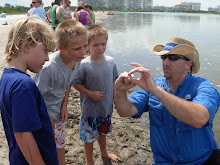Although anglers will not be able to keep snook on the west coast, they will no doubt continue to catch them. It will be more important than ever for anglers that catches snook to properly handle and release them to help the west coast population rebound and thrive.
Simply catching and releasing a fish does not always guarantee its survival. Even when a fish is healthy, factors such as time spent fighting on the line and out of the water, where it is hooked, and how it is handled can determine whether a fish will survive once it is released. When a fish is not as healthy,such as some of the fish still recovering from last season's cold spell, these factors can play even a larger role in the fish's post-release survival rate.
Research has shown that the survival rate of fish caught and released with proper handling techniques is significant. By following these practices, anglers help improve the survivability of the fish they release.
- Use tackle heavy enough to land a fish quickly. This reduces exhaustion, which can result in the death of the fish or weaken it, making it more vulnerable to predators or disease.
- If using a landing net, use small mesh, knotless nets made of non-abrasive materials to reduce skin and scale damage and the loss of slime when landing the fish.
- Fish should be handled gently and as little as possible. Never let fish flop on the boat deck or ground as this can cause scale and fin damage or internal injuries.
- Only gaff a fish when you are sure it is legal to harvest and you intend to keep it. In this case, do NOT gaff ANY snook you catch!
- Return fish to the water as quickly as possible to minimize stress. Dehooking devices can help remove hooks from a fish without removing it from water. If a fish must be lifted from the water, always support its weight horizontally and never lift a fish by its jaw; this can injure the fish so it can’t feed normally and/or harm its internal organs.
- When you must handle a fish, use wet hands, and never a towel to prevent removal of the fish’s protective slime coating. Do not touch the gills or eyes and never hold a fish by its gill cover.
- Consider using circle hooks when fishing with live or cut bait. Research has shown that circle hooks are more likely to hook a fish in the mouth rather than the gut, making them easier to remove and reducing harm to the fish. Bending down hook barbs can also reduce damage to the fish.
- If a fish is exhausted, revive it before releasing by holding the fish with the head pointed downward in the water and moving the fish back and forth to pass water over its gills until the fish is able to swim unassisted.
 |
If you would like to learn more about snook biology, impacts the cold spell had on the fishery, and ongoing research related to snook, Florida Sea Grant/UF Extension is hosting a snook seminar September 15th at Rookery Bay from 6PM-8PM. Click here for more information.






No comments:
Post a Comment